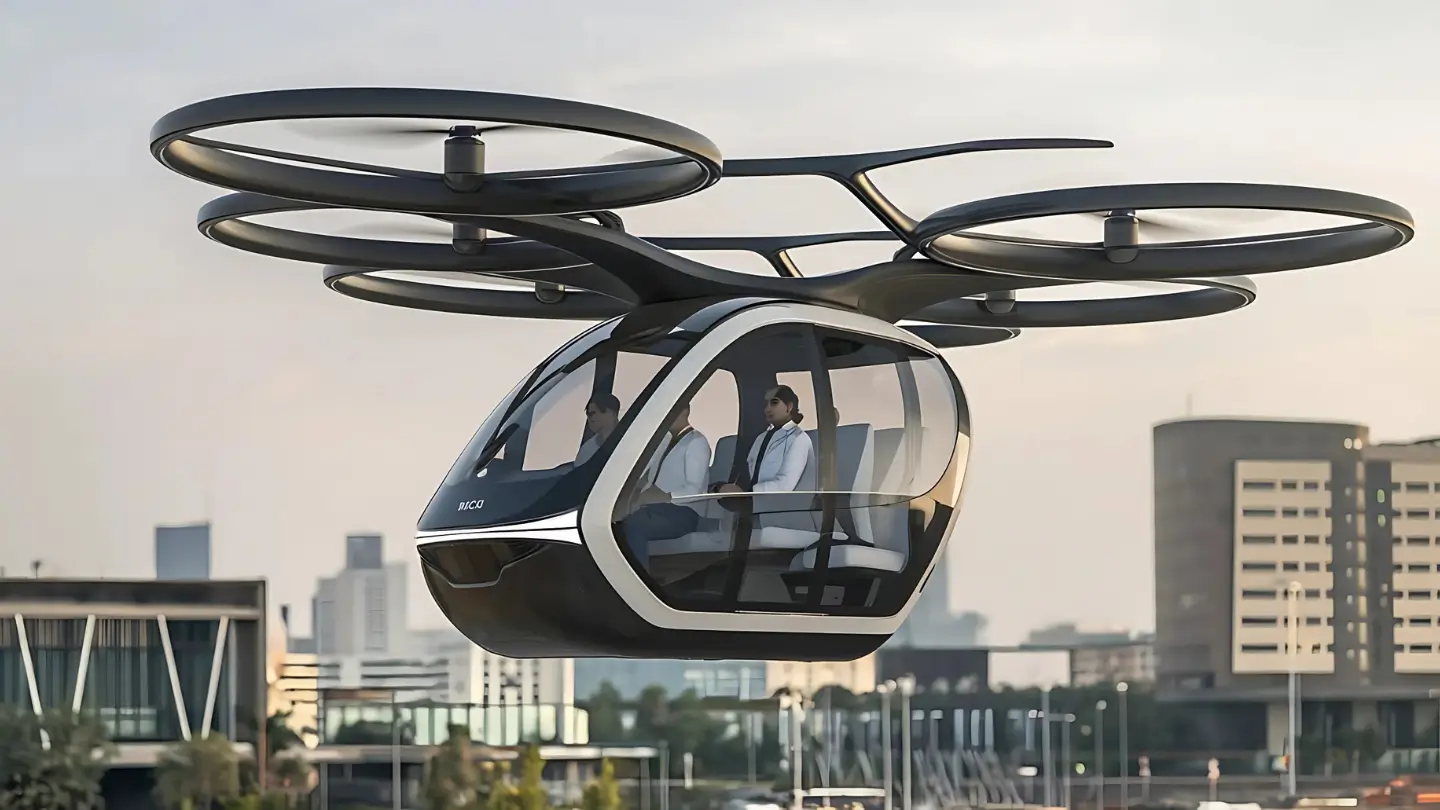
With Bengaluru’s Air Taxi Service set to launch shortly, this could soon become a reality, allowing commuters to travel from the city to the airport in only a few minutes.
Travel to Bengaluru’s International Airport usually takes hours due to long distances and endless traffic jams but it is all about to get significantly easier.
Bangalore International Airport Limited (BIAL) which operates the Kempegowda International Airport (KIA), has recently partnered with city-based Sarla Aviation to develop and launch electric flying taxis.
They have collaborated to work together and explore more about the sustainable air mobility solutions. They have also signed a statement of collaboration to find out more on the same, specifically electric vertical take-off and landing (eVTOL) aircraft.
This aircraft will make use of electric power to hover, take off and land vertically like helicopters.
This alliance is part of a larger vision to promote sustainable air mobility. It represents a new phase in the advancement of air mobility solutions.
The major focus would be on four of India’s busiest cities Bengaluru, Mumbai, Delhi and Pune with the objective to make air taxis a common mode of transport for the public.
The anticipated route from the Banglore International Airport to the city would take just 19 minutes by air compared to the 152 minutes it takes by road at present. An approximate fare of around Rs 1,700 per passenger could be estimated.
Sarla Aviation’s co-founder and CEO, Adrian Schmidt stated that they aim to reduce the time to just 5 minutes. “Currently, a trip from Indiranagar to the airport can take about 1.5 hours. With Sarla Aviation’s totally electric flying taxis, we will very soon cut that down to only five minutes,” he wrote in a recent LinkedIn post.
This venture, developed in Karnataka will be making use of an electric seven-seater eVTOL aircraft, reducing the travel time to get to the airport from the city to just minutes. This would lead to quicker, cleaner, and more efficient transportation, according to Sarla Aviation.
These electric aircrafts are designed to improve air transportation by offering quick and sustainable substitutes to commuting. These aircrafts would be able to reach a high speed of up to 250 km per hour, carrying seven passengers including the pilot.
It would only need about 15 minutes to charge in between trips.
Although its maximum range is expected to be around 160 kilometers, it would be best suited for 20 to 40 kms inner-city travel.
This partnership is a great way of revolutionizing air mobility and exploring innovative air transportation options, especially with the launch of the eVTOL aircraft.
Since the eVTOLs can fly short distances, it has great potential and offers a great solution to the city’s traffic & congestion problems.
The aircraft design places a strong and significant emphasis on redundancy, reducing the risk of failure with multiple backup systems. The aircraft’s electric propulsion system’s simplicity results in fewer mechanical components, which in turn reduces maintenance requirements and boosts dependability.
Sarla Aviation also envisions these aircrafts being used for urban air taxis, cargo deliveries as well as emergency medical services. They are also in touch with India’s Civil Aviation Ministry and the Directorate General of Civil Aviation (DGCA) to develop regulations to facilitate the growth of urban mobility.
Their aim is to redefine the way air transport works with operational efficiency, lower carbon emissions, and scalable infrastructure. The electric flying taxis will for sure set a new benchmark in dependability and performance whilst aligning with global standards for sustainable aviation.
This technology has huge potential and capacity to address the region’s traffic obstacles whilst providing an effective and efficient mode of travel. It is all set to transform the way of air mobility.
Bengaluru is well on its way to making this futuristic vision a reality. With the collaboration of BIAL and Sarla Aviation, the city is one step closer to introducing the electric flying taxis for faster air travel.
This collaboration plays a key role in advancing the future of urban air mobility in India. It is a transformative step paving the way for a greener and more sustainable transportation system.
However, despite all the buzz, the flying taxi service is still years away. The electric flying ecosystem, including regulatory approval, would still require time to develop.
Additionally, the prototype also hasn’t been built yet so there’s still a long way to go. The project will need to go through multiple phases, beginning with the development of a prototype, followed by testing and finally obtaining commercial airspace and regulatory approvals.
Even if operations might not begin for another two to three years, this service would be a far more affordable and cost-effective alternative to the conventional helicopter services previously being offered in the city.
This post was last modified on October 23, 2024 12:59 pm
In a major stride toward sustainable mobility, the Himachal Pradesh Police have incorporated six custom-modified Tata Curvv electric vehicles into…
In India, the automotive and transport industry is undergoing significant changes. This transformation isn't just about improving roads and infrastructure;…
Montra Electric, the clean mobility brand from the prestigious Murugappa Group, has launched the All-New Super Auto, a next-generation electric…
Union Minister Nitin Gadkari (Minister of Road Transport and Highways of India) has once again made a bold statement that’s got…
India’s electric four-wheeler (E4W) market slowed in September 2025, following a record-breaking August, with 15,038 units sold, representing an 18%…
India’s EV market hit 1,04,056 electric two-wheeler sales in September 2025. TVS, Bajaj, and Ather led the chart, while Ola…
This website uses cookies.